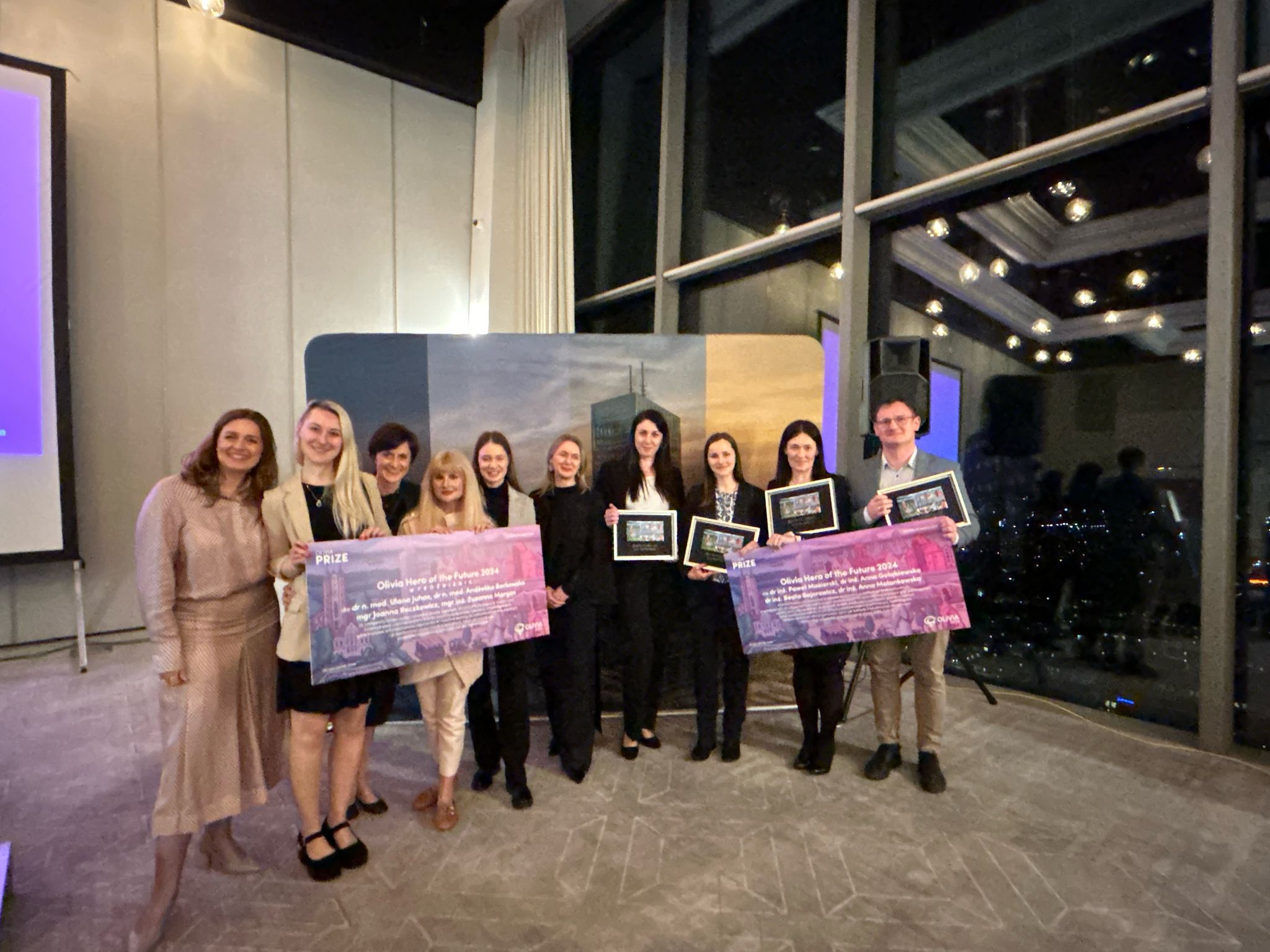MUG and UG teams awarded the Olivia Hero of the Future
The Olivia Centre, the largest business centre in Poland that has been awarding prizes for social and business innovations since 2020, recognised scientists from the Medical University of Gdańsk (MUG) and the University of Gdańsk (UG) in the Olivia Hero of the Future category during this year’s edition. The awards ceremony took place on 27 March at the 34th floor of the Olivia Star building.
The jury for the 5th edition of the Olivia Prize included: Marta Moksa (O4 Coworking), Prof. Sylwia Mrozowska (UG), Jolanta Szydłowska (Gdańsk Foundation for Management Development), Grzegorz Borowski (Infoshare), Paweł Jemioł (Nordea), Mateusz Kuszmierewicz (a multiple-time Polish medal winner in sailing), and Remigiusz Wojciechowski (Bayer).
Olivia Hero of the Future
The aim of the award in this category is to support and promote innovative projects developed by researchers from the Pomeranian region. The grand prize went to the team from the University of Gdańsk, consisting of Paweł Mazierski, Ph.D. Eng., Anna Gołąbiewska. Ph.D. Eng., Beata Bajorowicz, Ph.D. Eng., and Anna Malankowska, Ph.D. Eng., for their research and development work on advanced photocatalytic technologies designed for air and water purification. These technologies stand out not only for their high efficiency but also for their energy-saving and environmentally friendly features.
The team's work focuses on the development of innovative porous photocatalytic layers made from environmentally friendly TiO2 pastes and thin layers of TiO2 nanotubes, produced from titanium sheets or its alloys. This approach has successfully extended the contact time of pollutants with the active catalytic surface, significantly enhancing the efficiency of the purification process. The developed layers exhibit high photocatalytic activity and can be effectively used with energy-efficient LED lighting.
The technology developed by the scientists from the University of Gdańsk has been tested for the removal of volatile organic compounds (such as toluene), nitrogen and sulphur oxides, as well as microorganisms like Pseudomonas aeruginosa bacteria and bacteriophages with a structure resembling the SARS-CoV-2 virus. Work is also underway on the development of a thin-layer photocatalytic reactor, where TiO2 nanotubes are used as the active layer. This solution enables the effective inactivation of bacteria, as well as the degradation and transformation of organic compounds such as lignin, glycerol, hydroxymethylfurfural, furfural, furfuryl alcohol, organic dyes, phenols, and pharmaceuticals.
The significance of this research goes beyond the laboratory – it has direct implications for the economy, public health, and environmental protection. Owing to the developed technology, it is possible to efficiently remove toxic chemical compounds, dust, and microorganisms from air, which contributes to improving air quality and reducing the incidence of respiratory and cardiovascular diseases.
The high efficiency of the developed materials has enabled their application in innovative air purification devices, both in public spaces – such as photocatalytic towers in cities – and within buildings, including apartments, educational and medical facilities, as well as restaurants. The use of photocatalysis not only allows for the removal but, most importantly, the permanent degradation of pollutants, which gives it a clear advantage over traditional methods such as adsorption or filtration.
Distinction for the MUG
The competition jury also decided to award a distinction for the intelligent INFLASCOPE system, which analyses and predicts inflammatory states. This system aligns with the development of personalised and preventive medicine. The awarded research team included Ulana Juhas, Ph.D., Andżelika Borkowska, Ph.D., Joanna Reczkowicz, MSc., and Zuzanna Margas, MSc. Eng., from the Division of Bioenergetics and Physiology of Exercise at the Medical University of Gdańsk.
INFLASCOPE is an intelligent analytical platform operating in the Software as a Service (SaaS) model, which utilises routine blood tests for the automatic analysis and prediction of inflammatory states. The system calculates key inflammatory indexes such as SII, SIRI, MHR, NLR, PLR, and PIV, and identifies patterns in hematological data, and then generates risk forecasts along with clinical recommendations. By applying artificial intelligence and machine learning (AI/ML) algorithms, INFLASCOPE is able to detect subtle inflammatory trends and predict the risk of developing chronic conditions such as atherosclerosis, heart failure, or cancer.
The platform can be integrated with existing medical systems or used as a standalone diagnostic tool by healthcare professionals or individuals with access to standard blood count test results. As such, INFLASCOPE aligns closely with the evolution of personalized and preventive medicine, addressing the growing need for rapid, automated inflammatory risk assessment.
Notably, the team behind the project brings together expertise in biochemistry, physiology, and information technology and also represents a model of intercollegiate collaboration, as each researcher comes from a different academic institution in the Tri-City area.
The creators of this innovative system are already planning the next stages of development, including the preparation of a pilot version, steps toward market implementation, and partnerships with stakeholders in the medical, engineering and academic sectors.


